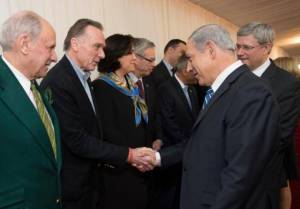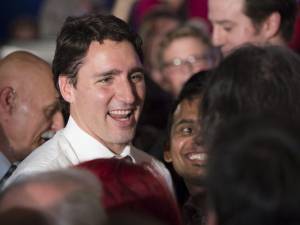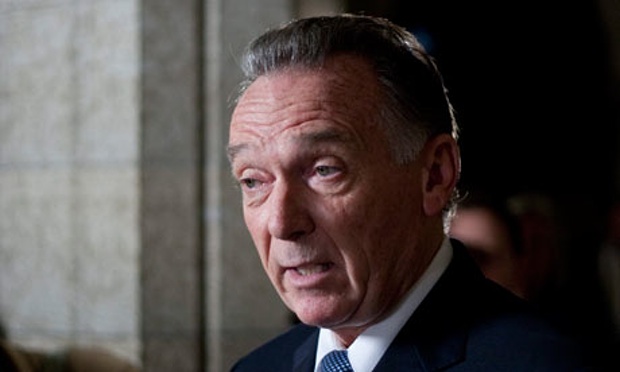
Canadian Parliamentarian Peter Kent (L) shakes hands with PM Benjamin Netanyahu at the Canadian government mission to Israel in January 2014. (Facebook)
Conservative Member of Parliament Peter Kent, a staunch supporter of Israel, won a large majority in his riding, nearly half of which is Jewish, in the recent Canadian national election. Now a member of the Opposition under a Liberal government, he discusses his bittersweet victory and the issues for which he intends to fight.
Despite the sweeping Liberal victory in last week’s Canadian national election, Conservative Member of Parliament Peter Kent maintained his position in the largely ethnic Thornhill riding with an overwhelming majority.
Kent, an award-winning journalist and member of the Canadian Broadcast Hall of Fame, entered politics in 2006. A board member of Honest Reporting Canada, a watchdog that monitors media bias against Israel, he discussed the election results with United with Israel.
The Thornhill riding population is nearly 50% Jewish. Prime Minister Stephen Harper’s unwavering support for Israel, however, was not the critical factor determining Jewish community votes, Kent said, noting that many high-profile Jews voted Liberal. In fact, the Jewish community has historically voted Liberal, although support for the Conservatives rose significantly in recent years due to Harper’s consistent stand in defense of the Jewish state and against Islamism.
Case in point: In June, a controversial provision in Bill C-24 came into effect under the Conservative leadership, allowing the government to revoke Canadian citizenship from dual citizens convicted of terrorism, high treason and several other serious offenses. Leading spokespeople for the Jewish Refugee Action Network (J-RAN), consisting of Liberal supporters, fought against the bill, arguing that deportation and the annulment of citizenship is “un-Canadian.”
“We have to look at the very real threat. I don’t want to be proven right by having another terror attack in Canada,” Kent said, referring to two separate attacks in Ottawa in October 2014, committed by French-Canadian converts to Islam, in which two soldiers and an officer were killed.

Canadian Prime Minister-elect Justin Trudeau (Paul Chiasson, AP)
Trudeau “made a lot of election promises that are wrong-headed,” such as bringing refugees into the country without proper screening, he continued, adding that the newly elected prime minister “is going to create problems if he doesn’t rethink these promises.”
Only a day after winning the election, Trudeau announced his decision to withdraw fighter jets from the US-led coalition fighting the Islamic State (ISIS).
According to Kent, Trudeau is “following a lot of that old-fashioned isolationism and has an outdated vision of Canada as a peacekeeper. A lot of Liberals are living in the past…. Peacekeeping is impossible with ISIS (Islamic State terrorist group), the Taliban. We have a real security threat at home and if we don’t stop ISIS in the Levant and in the developing countries, we’ll have to stop them here. More young Canadians have been radicalized and gone to join ISIS than in the US.”
Differing Policy on Iran
Kent also takes issue with Liberal policy vis-à-vis Iran. Trudeau is “really naïve and out of touch with reality when he says he’ll establish friendly diplomatic relations with Iran. You can’t do that with a country that promotes terrorism and revolution.”
Expanding on the nuclear agreement between Iran and the six US-led global powers, he adds that “all Obama has done, to use an old football term, is punted the crisis to his successor. They [Iranian leaders] mock Obama. Money is going to support terror regimes, they’re a major sponsor of terror. Nuclear inspections will not take place as planned.”
The Harper government closed the Canadian embassy in Tehran in 2012 and expelled Iranian diplomats from Ottawa, listing the Islamic Republic as a state sponsor of terrorism under the Justice for Victims of Terrorism Act.
“I would hope that Canada would be able to reopen its mission. As I understand it, there were security concerns that led to the closing of the mission, but I’m fairly certain that there are ways to re-engage,” Trudeau said in June in an interview with Canada’s CBC News.
“We’re going to push hard,” Kent stated, regarding his role as a parliamentarian. “We want him to reassess [these issues]. When you make a bad campaign promise, you should have the courage to review it and reverse it when you realize just how wrong it is.”
Trudeau’s party includes a number of controversial lawmakers with regard to the Middle East, such as Member of Parliament Omar Alghabra, a close adviser to the prime minister. He is a former president of the Canadian Arab Federation (CAF), which the Harper government had banned from receiving funding, citing its support of terrorism and anti-Semitism. In 2014, following an appeal by CAF, the Federal Court upheld the government decision.
Trudeau Opposes Boycotts Against Israel
Nevertheless, the prime minister-elect has stated his “enduring bond of friendship [with Israel], rooted in our shared commitment to peace and democracy,” as well as denouncing the Boycott, Divestment and Sanctions (BDS) movement against the Jewish state.
“For Trudeau and some in the Canadian leadership to say that the Liberals are identical to our Conservative policy on Israel and the Middle East is just not true, and we know that,” Kent asserted.
Nevertheless, “Canadians have spoken,” he acknowledged. “We have to respect Trudeau as prime minister.”










